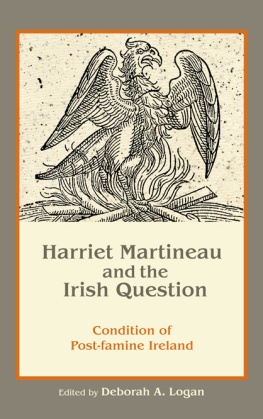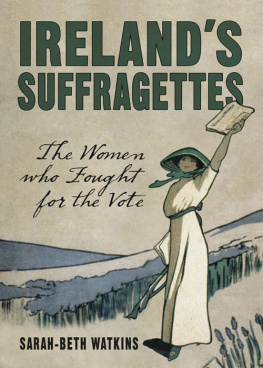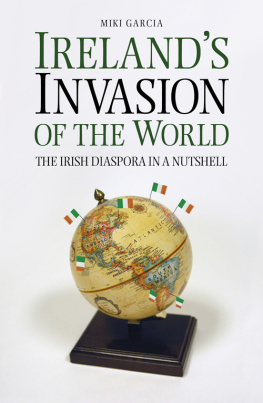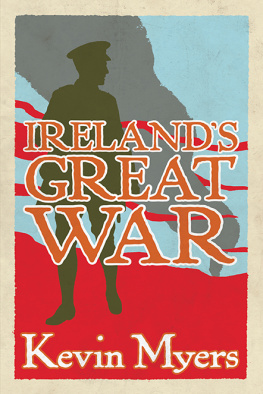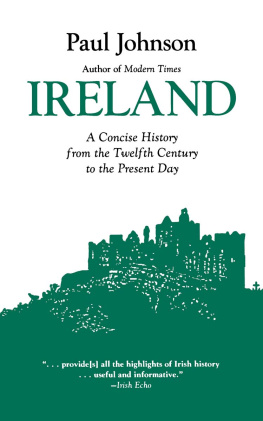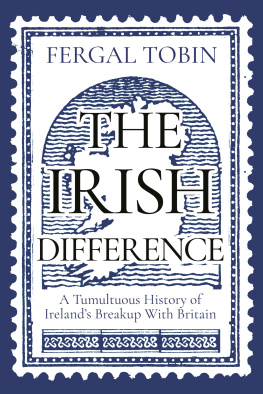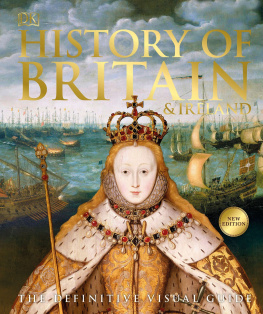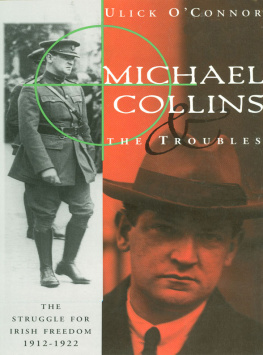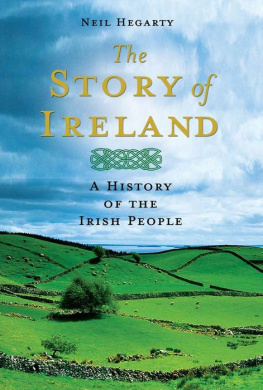Ireland in the World Order

First published 2012 by Pluto Press
345 Archway Road, London N6 5AA
www.plutobooks.com
Distributed in the United States of America exclusively by
Palgrave Macmillan, a division of St. Martins Press LLC,
175 Fifth Avenue, New York, NY 10010
Distributed in the Republic of Ireland and Northern Ireland by
Gill & Macmillan Distribution, Hume Avenue, Park West, Dublin 12, Ireland.
Phone +353 1 500 9500. Fax +353 1 500 9599. E-Mail: sales@gillmacmillan.ie
Copyright Maurice Coakley 2012
The right of Maurice Coakley to be identified as the author of this work has been asserted by him in accordance with the Copyright, Designs and Patents Act 1988.
British Library Cataloguing in Publication Data
A catalogue record for this book is available from the British Library
ISBN 978 0 7453 3126 3 Hardback
ISBN 978 0 7453 3125 6 Paperback
ISBN 978 1 84964 731 1 PDF
ISBN 978 1 84964 733 5 Kindle
ISBN 978 1 84964 732 8 ePub
Library of Congress Cataloging in Publication Data applied for
This book is printed on paper suitable for recycling and made from fully managed and sustained forest sources. Logging, pulping and manufacturing processes are expected to conform to the environmental standards of the country of origin.
10 9 8 7 6 5 4 3 2 1
Designed and produced for Pluto Press by Chase Publishing Services Ltd
Typeset from disk by Stanford DTP Services, Northampton, England
Simultaneously printed digitally by CPI Antony Rowe, Chippenham, UK and Edwards Bros in the United States of America
Acknowledgements
I owe a huge number of debts to those who shared time and ideas and who bore with me over the course of writing this. Peter Hannon and his colleagues in the Education Department of the University of Sheffield were always open minded and engaging. I am grateful to Roger van Zwanenberg for persuading me to update the earlier work to address contemporary developments and to all the staff at Pluto. My colleagues in the Journalism and Media faculty of Griffith College have been supportive and I am particularly grateful to the staff in the College library and printroom for their patience and assistance. Brian McCarthy very kindly permitted me to use the Sword of Justice image for the book cover. Andy Storey, Margaret Kelleher and Paddy OBrien read earlier drafts and commented helpfully on them. My greatest debts are to Petra Schurenhofer without whose assistance and encouragement I would most likely never have completed it.
Preface
In November 2010, when the Irish government was negotiating with the European Union (EU) and other transnational bodies on schemes to resolve Irelands financial problems, the International Monetary Fund (IMF) came up with a proposal that would have involved the major bondholders taking a significant haircut, in the process reducing the Irish debt to a potentially manageable level. The European Central Bank (ECB) strongly opposed any haircut for the bondholders, insisting that the Irish state pay all the debts incurred by the privately owned Irish banks, even though this would most likely bankrupt Ireland. In this dispute, the Irish government officials sided with the ECB, leading one IMF staff member to describe the Irish government negotiators as displaying elements of the Stockholm syndrome, a situation whereby hostages sometimes come to identify with their captors (Kelly, 2011).
Why were Irish government officials suffering from Stockholm syndrome? Or to put the question differently, how was it that Irish government officials had come to identify with transnational institutions that were seeking to impose severe penalties on the Irish population, rather than with their own people?
The answer to this question is related to the story of this book. It began from a sense of dissatisfaction with the dominant interpretation of Irish history and with an attempt to present an alternative approach that might make sense of that history. The events surrounding the collapse of the Celtic Tiger make it clear that these issues are not just of academic import, but are of contemporary relevance. This water is still flowing.
The dominant currents within Irish historical studies avoided any exploration of the structural relationship between Ireland and Britain as a matter of methodological principle. Notions of colonialism were considered redundant. Irish historians, for the most part, tended to minimise the significance of the Conquest, and to interpret it as the unfortunate consequence of misunderstandings and policy mistakes. More than that: the work of many Irish historians carried a sub-text whereby British governance of Ireland was perceived as civilised, rational and cosmopolitan, while Irish resistance was seen as narrow, primitive and atavistic. This attitude was compounded by a consistent downplaying of the close association between the quest for democracy and national independence.
How far this understanding of history has contributed to the development of a Stockholm syndrome mentality among Irish intellectual and political elites is certainly open to debate, but it has undoubtedly played a role. It helped legitimate the British state in the Northern Ireland conflict and has acted as a deterrent to critical debate about Irish development and European integration.
This book is not intended as a comprehensive history of Ireland. It is rather a study of a particular aspect of Irish history, an exploration of how Ireland fitted into the formation of the modern world order, and specifically why it developed so differently from England, Scotland and Wales. The final section of the book explores the relationship between Irelands earlier historical experience and its current predicament. A world order or world system only came into existence in the Renaissance era, in the sixteenth century. I begin my analysis earlier, in the twelfth century at the point where Ireland first came under the sway albeit only partially of the English state, in order to understand why it was that Ireland came to occupy such a radically different position within the emerging world order.
Glossary
Aisling | Gaelic allegorical poems in post-conquest Ireland. Ireland (or Gaelic society) is usually represented as a woman awaiting a saviour. |
Aosdana | Gaelic term for learned strata, including poets, lawyers etc. |
Bailie | Scottish Gaelic term for townlands, similar in Ireland. |
Betagh | Term used in Anglo-French areas for serfs. |
Brehon | Anglicised term for Gaelic lawyer/judge. |
Clan | Gaelic term for larger family-linked groups, theoretically lineage based. |
Clan na Gael | American Fenian organisation. |
Cyfarwydyd | |


